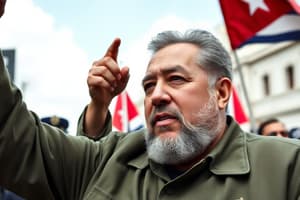Podcast
Questions and Answers
What significant event did Fidel Castro lead in the late 1950s?
What significant event did Fidel Castro lead in the late 1950s?
- Signing of a peace treaty with the Soviet Union
- Establishment of a democratic government in Cuba
- Overthrow of Fulgencio Batista (correct)
- Formation of the United Nations
What impact did television have on sports in the 1950s?
What impact did television have on sports in the 1950s?
- Eliminated the need for radio broadcasts
- Brought sports to millions of new fans (correct)
- Decreased national interest in local sports
- Increased attendance at live events
During which conflict was there an active draft for men in the early 1950s?
During which conflict was there an active draft for men in the early 1950s?
- Cold War
- Vietnam War
- World War II
- Korean War (correct)
What was a challenge faced by early sports broadcasts?
What was a challenge faced by early sports broadcasts?
What resulted from the decision of Hempfield and other districts in April 1954?
What resulted from the decision of Hempfield and other districts in April 1954?
What event led to accusations of biased judging during the 1956 Melbourne Olympics?
What event led to accusations of biased judging during the 1956 Melbourne Olympics?
Which country decided to boycott the 1952 Helsinki Games due to legitimacy disputes?
Which country decided to boycott the 1952 Helsinki Games due to legitimacy disputes?
What was a significant cultural shift brought about by the launch of Sports Illustrated in 1954?
What was a significant cultural shift brought about by the launch of Sports Illustrated in 1954?
How were Soviet athletes treated during the 1952 Helsinki Olympics?
How were Soviet athletes treated during the 1952 Helsinki Olympics?
What achievement did Althea Gibson accomplish between 1956 and 1958?
What achievement did Althea Gibson accomplish between 1956 and 1958?
Flashcards are hidden until you start studying
Study Notes
Global Events: Cuban Revolution
- Fidel Castro led a successful revolution in the late 1950s, overthrowing Cuban Director Fulgencio Batista.
- After gaining power, Castro established a communist regime and served as Prime Minister and Commander in Chief.
- Strengthened ties with the Soviet Union, ultimately leading to the Cuban Missile Crisis, a pivotal moment in the Cold War.
Korean War Draft
- An active military draft for the Korean War emerged in the early 1950s.
- Male college students could complete their academic year before entering military service or the draft.
- Some men from the South were deemed unfit for military service.
Local Events: School District Merger
- In April 1954, directors from Hempfield and nearby areas agreed to merge school districts.
- The merger followed disagreements among directors but concluded with a cooperative consensus.
Broadcasting Sports
- Television expanded sports' audiences, particularly boosting the popularity of baseball.
- Compact sports like wrestling and boxing benefitted from easy coverage and audience engagement.
- Early broadcasts lacked advanced technology and replay options, but quality improved during the decade.
- By 1958, 800 major league baseball games were televised, and football began to attract significant network investments.
- Increased TV coverage contributed to reduced attendance at minor-league baseball games.
- Legislative advancements such as the Sports Broadcasting Act enhanced national sports coverage.
Cold War Olympics
- Olympics became intertwined with political tensions, despite claims of neutrality.
- 1952 Helsinki Olympics featured Soviet athletes housed under restrictive conditions and a boycott from Nationalist China.
- 1956 Melbourne Olympics saw multiple country boycotts due to global conflicts and biased judging accusations.
- Hungarian athletes famously defected after a contentious match with the USSR.
Birth of Sports Illustrated
- Launched on August 16, 1954, transforming sports journalism for middle-class Americans.
- Initially diverse in content, it shifted focus to major male sports like baseball and football by the late 1950s.
- The magazine innovated investigative sports journalism addressing topics such as fitness and gambling.
Notable Athletes in the 1950s
- Althea Gibson: First African American to win major tennis tournaments, including Wimbledon and the U.S. Nationals, dominating women's tennis from 1956 to 1958.
- Ben Hogan: Overcame a severe bus accident to win the U.S. National Open a year later; renowned for skill and technical proficiency, winning over sixty tournaments.
- Bill Russell: Known for his exceptional rebounding and defense; led the Boston Celtics to eleven championships and broke racial barriers as the first African American head coach in the NBA.
- Rocky Marciano: Undefeated heavyweight champion with a perfect career record; gained fame by defeating Joe Walcott and retiring without losses.
- Mickey Mantle: Yankee legend with remarkable seasons; won the Triple Crown in 1956, noted for leadership and consistency in performance.
- Willie Mays: Star player for the New York Giants, known for his exceptional skills, including a record of 660 home runs; pivotal in the Giants' triumph during the 1954 World Series.
The Turning Point in Football
- In the 1950s, the NFL surpassed college football in popularity, capturing a nationwide audience.
- Television revolutionized the sport by making every play a major event.
- While the NFL rose, college football remained popular due to passionate rivalries, encompassing teams like Notre Dame.
Studying That Suits You
Use AI to generate personalized quizzes and flashcards to suit your learning preferences.





